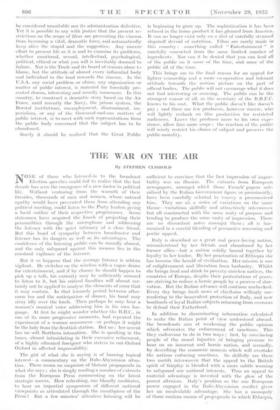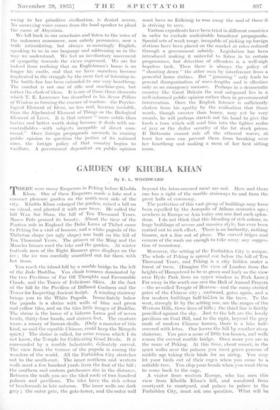THE WAR ON THE AIR
By STEPHEN CUSS OLD NONE of those who listened-in to the broadcast Election speeches could fail to realise that the last decade has seen the emergence of a new factor in political life. Without venturing from the warmth of their firesides, thousands of men and women, whose natural apathy would have prevented them from attending any political meeting, could listen to the Party leaders giving a lucid outline of their respective programmes. Some statesmen have acquired the knack of projecting their personalities through the microphone and addressing the listener with the quiet intimacy of a dose friend. But this bond of sympathy between broadcaster and listener has its dangers as well as its advantages. The confidence of the listening public can be roundly abused, and the only safeguard against this menace lies in the constant vigilance of the listener.
But it so happens that the average listener is seldom vigilant. Iie switches on the wireless with a vague desire for entertainment, and if by chance he should happen to pick up a talk, his curiosity may be sufficiently aroused to listen to it, but his critical faculties will almost cer- tainly not be applied to analyse the elements of error that it may contain. • In that leisurely period between after- noon tea and the anticipation of dinner, his hand may stray idly over the knob. Then perhaps he may hear a woman's musical voice addressing him in his own lan- guage. At first he might wonder whether the B.B.C., in one of its more progressive moments, had repeated the experiment of a woman announcer—or perhaps it might be the lady from-the Scottish station. But no ; her accent has no soft Northern intonation. She is speaking in the tones, almost intimidating in their excessive refinement, of a highly educated foreigner who strives to out-Oxford Oxford in affected impeccability.
The gist of what she is saying is of burning topical interest—a commentary on the Italo-Abyssinian situa- tion. There seems no suspicion of blatant propaganda in what she says ; she is simply reading a number of extracts from the European Press commenting on the latest strategic moves. How refreshing, one blandly meditates, to hear an impartial symposium of different national viewpoints as articulated through the mouthpiece of the Press 1 But a few minutes' attentive listening will be sufficient to convince that the first impression of impar- tiality was an illusion. The extracts from European newspapers, amongst which those French' papers sub- sidised by the Italian Government figure zo prominently, have been carefully selected to rnnvey a preconceived bias. They are ail a series of variations on the same theme—variations skilfully and attractively interwoven but all constructed with the same unity of purpose and tending .to produce the same unity of impression. There are no discordant notes amongst them ; all is har- monised in a careful blending of persuasive reasoning and poetic appeal.
Italy is described as a great and peace-loving nation, misunderstood by her friends and abandoned by her former allies—but a nation solidly bound together by loyalty to her leader. By her penetration of Ethiopia she has become the herald of civilisation. Her mission is one of enlightenment and liberation from barbarity.- Whilst she brings food and drink to poverty-stricken natives, the countries of Europe, despite their protestations of peace, are striving to reduce a heroic people by a. process of star- vation. But the Italian advance will continue unchecked. Every day brings fresh news of chieftains willingly sur- rendering to the benevolent protection of Italy, and new boatloads of loyal Italian subjects returning from overseas to defend their Fatherland.
In addition to disseminating information calculated to make the Italian 'point of view understood abroad, the broadcasts aim at weakening the public opinion which advocates the enforcement of sanctions. This they endeavour to do in two ways ; first, by convincing people of the moral injustice of bringing pressure to bear on an innocent and heroic nation, and secondly, by describing the economic nemesis which will overtake the nations enforcing sanctions. So skilfully are these two motifs interwoven that the appeal to the British spirit of fairpla.y is blended with a more subtle warning to safeguard our national interests. Thus an appeal to material ad-vantage is invested 'with the glow of the purest altruism. position as the one European power engaged in the Italo-Abyssinian conflict gives her an incalculable advantage. She has a monopoly of those modem means of propaganda to which Ethiopia, owing to her primitive civilisation, is denied access. No answering voice comes from the loud speaker to plead the cause of Abyssinia.
We loll back in our armchairs and listen to the voice of the unknown announcer, now calmly persuasive, now a trifle intimidating, but always re-assuringly English, speaking to us in our language and addressing us in the way we understand. We feel an involuntary movement of sympathy towards the views expressed. We are far indeed from realising that an Englishman's home is no longer his castle, and that we have ourselves become implicated in the struggle by the mere fact of listening-in. The battle line has been extended to our very hearthrug. The combat is not one of rifle and machine-gun, but rather the clash of ideas. It is one of those three elements which T. E. Lawrence has described in his Seven Pillars of Wisdom as forming the essence of warfare—the Psycho- logical Element of Ideas, no less real, because invisible, than the Algebraical Element of Things or the Biological Element of Lives. It is that science " more subtle than tactics and better worth doing because it deals with un- controllables—with subjects incapable of direct com- mand." Once foreign propaganda succeeds in causing public opinion to question the justice of its national aims, the foreign policy of that country begins to vacillate. A government dependent on public opinion must have no Erlki3nig to woo away the soul of those it is striving to save.
Various expedients have been tried in different countries in order to exclude undesirable broadcast propaganda. Special sets of weak range, incapable of picking up foreign stations have been placed on the market at rates reduced through a government subsidy. Legislation has been introduced making it unlawful to listen in to certain programmes, but detection of offenders is a well-nigh hopeless task. Then there is always the policy of " shouting down " the other man by interference from a powerful home station. But " jamming " only leads to general disorganisation of wave-lengths and is effective only as an emergency measure. Perhaps in a democratic country like Great Britain the real safeguard lies in a well-informed public opinion rather than in governmental intervention. Once the English listener is sufficiently shaken from his apathy by the realisation that those words, though sweeter than honey, may yet be very swords, he will perhaps stretch out his hand to give the knob a turn which will send him into the lighter realm of jazz or the duller security of the fat stock prices. If Britannia cannot rule all the ethereal waves, at least her sons can prevent them from breaking over her hearthrug and making a mess of her best sitting room.













































 Previous page
Previous page